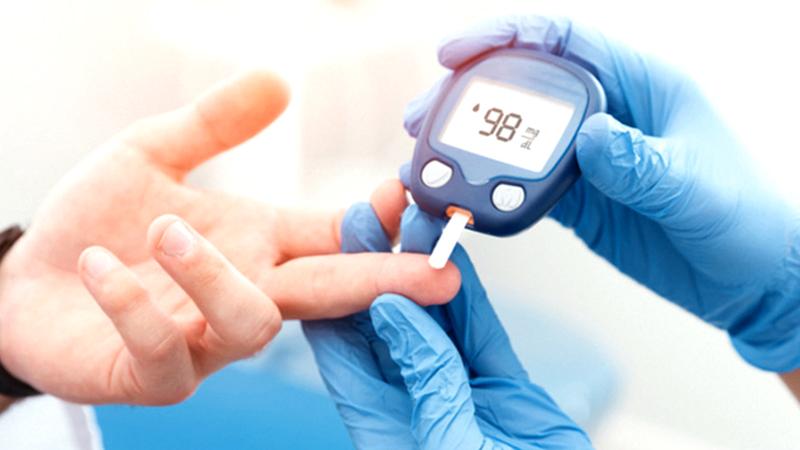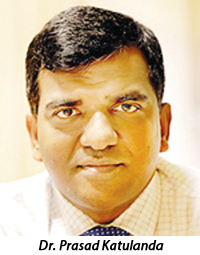
Ranking among the top ten causes of death with the numbers rising to nearly 500 million globally today, Diabetes poses a serious threat to global health, with patients at risk of developing several serious life threatening complications such as retinopathy, nephropathy, neuropathy and premature cardiovascular disease resulting in morbidity and mortality.
 Unfortunately, this highly preventable disease stems fundamentally from modifiable factors starting with sugar rich and carbohydrate rich diets and sedentary lives which together contribute to weight gain and puts one at risk of developing type 2 diabetes, the commonest form of diabetes in Sri Lanka, warns Senior Lecturer in Medicine, University of Colombo and Consultant Endocrinologist and Diabetelologist National Hospital of Sri Lanka, Vidya Jyothi Dr. Prasad Katulanda .
Unfortunately, this highly preventable disease stems fundamentally from modifiable factors starting with sugar rich and carbohydrate rich diets and sedentary lives which together contribute to weight gain and puts one at risk of developing type 2 diabetes, the commonest form of diabetes in Sri Lanka, warns Senior Lecturer in Medicine, University of Colombo and Consultant Endocrinologist and Diabetelologist National Hospital of Sri Lanka, Vidya Jyothi Dr. Prasad Katulanda .
Drawing from his expertise he tells Sunday Observer readers why the Diabetes Federation , with several other allied stakeholders including the NCD Bureau of the Health Ministry have for the past ten years or more been actively organising activities to educate and raise awareness on the prevention of this debilitating disease.
Excerpts …
Q. On November 14 health authorities shone their spotlight on a subject that has become increasingly worrying, namely, the surge in the number of Diabetes Mellitus across the world. Why was November 14 chosen to observe this day and why was it important to set aside a special day for this illness?
A. Diabetes mellitus has become a worldwide pandemic with over 450 million people affected. Diabetes causes death and disability to millions of people worldwide. This is why the World Health Organization (WHO) has declared a special day for this disease.
Q. Your theme every year has changed with the times. What was this year’s theme? How relevant is it to the most pressing needs of diabetic patients at this time around?
A. This year the theme was ‘Diabetes and the Nurse’ to highlight the important role played by nurses worldwide in caring for patients and educating them. However, we feel that ‘Diabetes and Covid-19’ would have been a better theme.
Q. Many have heard of Diabetes but most diabetic patients are still unaware they have the disease till it has advanced to a late stage causing complications. So tell us, what is diabetes? Is it an Endocrine disease? Is it contagious?
A. Diabetes occurs due to deficiency of insulin hormone in the body or due to the resistance the tissues have for insulin hormone. That is why we call it an endocrine disease. It is not contagious, and is one of the main non-communicable diseases.
Q. Are there different types of diabetes? Which type is most common 1) globally? 2) in Sri Lanka?
A. Diabetes has several subtypes. Type 2 is the commonest and mainly affects adults. Type 1 affects children and youngsters. There are several other subtypes including diabetes in pregnancy and genetically inherited rare forms.
Q. Age wise who are most at risk of developing DM? Why?
A. Several decades ago, older people were at higher risk, but now we see more and more middle aged and younger age people developing diabetes.
Q. Gender wise who are more vulnerable, – men or women? Why?
A. There is hardly any difference, but this differs in different societies. Overall it may be males but in societies where women are more obese, they may have higher prevalence of diabetes.
Q. Have you any recent studies on the number of persons diagnosed as Diabetics in Sri Lanka?
A. The studies done in Sri Lanka are more than a decade old. But some small-scale studies done in the Western Province have shown very high numbers perhaps closer to 25% of adults having diabetes.
Q. What organs of the human body are most affected? Kidney? lungs?
A. Diabetes typically affects kidneys, eyes and nerves. But diabetics are also at high risk of heart disease and problems in the feet.
Q. What are the adverse health impacts of diabetes?
A. Diabetes causes kidney failure, blindness, nerve damage, heart attacks, stroke and lower limb amputation.
Q. Can diabetes affect one’s eyesight and cause low vision or total loss of sight, blindness e.g. Retinal blindness?
A. Yes diabetes is a common cause of adult blindness. It can cause partial or complete loss of vision.
Q. Is there a link between diabetes, heart failure and stroke?
A. Yes diabetes can cause heart failure as it predisposes people to get heart attacks. In addition, some people with diabetes can get heart failure without having heart attacks. Diabetes also increases the risk of stroke.
Q. Does it affect one’s limbs and result in swelling of knees due to constriction in the nerves, making it difficult for the patient to move freely?
A. Diabetes affects the limbs by damaging the nerves and blood vessels due to infections which are commoner in those with diabetes.
Q. Any other symptoms we need to be aware of?
A. Diabetes can cause skin infections, urine and genital infections and sexual dysfunction.
Q. Causes? Is DM caused by a single factor or is it a multi factoral disease combining many factors? If so what are they?
A. The common form, type 2 diabetes occurs in those with genetic risk when they become obese, lead sedentary lifestyles, has sleep deprivation or uses some medications (such as steroids) that would increase risk.
Q. Are lack of exercise, sedentary lives and unhealthy lifestyles contributory factors?
A. Of course, excess consumption of calories, lack of exercise all contribute to diabetes.
Q. What about the diet? It has been said that poor diets and malnourishment can cause diabetes?
A. Poor diet with a lack of green vegetables, high in starch and fat can lead to diabetes.
Q. Pre -Diabetic children are on the increase in Sri Lanka. What are the causes?
A. The risk factors are the same, obesity, sedentary lifestyle and poor diet.
Q. What are the symptoms to look for in a pre diabetic child?
A. They initially become obese and their neck area and armpits become dark (acanthosis).
Q. Treatment- is the treatment the same?
A. For prediabetes it is better to change the lifestyle into a healthier lifestyle with healthier diet and an increase in physical exercise.
Q. Is diabetes curable? Reversible?
A. Diabetes is usually not considered curable. But those who are obese and whose diabetes was diagnosed recently, can be reversed with a very strict lifestyle.
Q. Will early detection prevent the disease progress?
A. Of course, if diabetes is detected early and good control measures are taken its progression can be slowed.
Q. Since women are more at risk, at what age should a female get screened for diabetes?
A. Women should have diabetes checked before planning to become pregnant, usually around 35 years. But if the risk is higher diabetes check may be done even at a younger age.
Q. What about men? Is there a difference in the age of screening?
A. Men also should check their diabetes at similar ages.
Q. Is screening for diabetes in women mandatory?
A. Checking for diabetes is mandatory when they become pregnant and when planning a pregnancy.
Q. How do you advise pre pregnant women with diabetic close relatives when they come to you for advice?
A. We ask them to check the blood for diabetes.
Q. What about pregnant women admitted to hospital because they have developed complications following temporary diabetes during pregnancy?
A. When a pregnant woman is admitted with diabetes, we take measures to control the diabetes very tightly and screen for complications.
Q. When a patient comes to the Out Patients’ clinic for the first time do you screen her for diabetes?
A. If the patient is pregnant or has any clinical features suggestive of diabetes or its complications, we check them for diabetes.
Q. Who does the screening – nurses, PHI, midwives? Are they supervised by an MOH?
A. Usually nurses and midwives under the supervision of the MOH take steps to screen for diabetes.
Q. What is the initial test to find out if you are diabetic?
A. Diabetes is diagnosed using blood tests. You can do a fasting glucose test, HBA1C test or in a person with symptoms a random blood glucose test.
Q. Do these tests have to be done in a sterile hospital setting?
A. No these tests can be done in any medical clinic.
Q. Alternatively can they be done in mobile clinics or makeshift tents in remote areas where some populations are too far from hospitals?
A. Of course.
Q. Prevention – how do you prevent diabetes? What are the latest interventions by the Health Ministry?
A. Diabetes can be prevented by a healthy lifestyle starting from childhood. Healthy eating and physically active lifestyle and not being obese is important.
Q. As a leading member of the Sri Lanka Endocrinologist Association what steps have you taken in the recent past to raise more awareness on this issue and prevent or minimise diabetes risks?
A. We have done very regular public education through electronic and print media.
Also we have educated other health care workers on how to prevent diabetes and its complications.
Q. According to the International Diabetes Federation, by 2035, almost 600 million may be living with diabetes. 415 million adults have diabetes. By 2040 this will rise to 642 million.
How do you see Sri Lanka’s position in relation to these projected figures considering that we have a fast aging population with women outliving men?
A. As our population is small compared to countries like China and India our total numbers may be smaller. But if we take the percentages, we have a higher percentage than India and China.
Q. Your advice to diabetics on how they can protect themselves from the impact of Covid-19?
A. Diabetes increases complications of Covid-19. Therefore, people with diabetes and their family members should take extra precautions to protect themselves.
They should control diabetes well to reduce complications.
Q. Any Dos and Don’ts on preventing diabetes?
A. Don’t use sugar, cut down on carbs and don’t be sedentary. Be active and engage in physical exercise, eat more green vegetables and green fruits.
